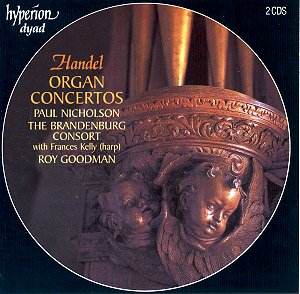This always was a particularly
interesting recording of the Handel
organ concertos, and it's good to have
it made available at bargain price.
Its special claim to fame is having
been recorded on the delightful little
organ of St Lawrence, Whitchurch (near
Edgware, in North London) which Handel
himself is known to have played - between
1718 and 1721 - whilst in the service
of nearby resident the Duke of Chandos.
With a significant number of its original
voices still operational, its 1994 rebuild
by Goetze and Gwynn has enabled us once
again to enjoy the instrument very much
as it was in Handel's day. So we can
be fairly sure that the sound
of the solo instrument on this CD, not
to mention the acoustic of the church,
is historically accurate.
But let's not get too
excited about this. It is after all
particularly difficult to be sure that
any recording of the Organ Concertos
successfully captures the way Handel
intended us to hear them, because -
as vehicles for Handel's spontaneous
display and improvisatory skills, often
written - i.e. notated - under great
pressure - they're littered with shorthand
and incomplete information, and in several
instances exist in more than one version.
This requires a great deal of modern
interpreters, who need to make fundamentally
important decisions, about the text
itself, not just simple matters such
as tempo or dynamics, on the basis of
barely sufficient evidence. For us collectors,
that means different recordings can
sound very different to one another:
so we don't need an excuse for having
alternative versions on our shelves!
One very agreeable
quirk of this Nicholson-Goodman collaboration
is the inclusion (in Op. 4 No. 4 in
F major) of the choral 'Alleluia' from
Athalia (the one Handel eventually
incorporated into The Triumph of
Time and Truth) which is known to
have been added to a 1737 performance.
Rather less of a surprise,
but just as likely to provoke a smile,
is the original version (for solo harp)
of Op 4 No 6 in B flat major. It's well
known in this form, of course: and how
very stylish though sedate Frances Kelly's
playing is! But what a pity these well-filled
discs have no room for both harp and
organ versions.
These performances
are extremely enjoyable, and the recorded
sound is very believable. That said,
be advised that the character of both
is intimate. If you know the van Asperen,
Hurford or Koopman alternatives, which
are generally bolder and more resonant,
you may find its sense of scale just
too limiting. And Nicholson's playing
though admirably polished communicates
more of a studied respect for Handel
than the flamboyance one imagines distinguished
Handel's own playing. But Goodman's
direction is as lively as ever it was,
and Marc Rochester's notes are excellent.
Peter J Lawson












